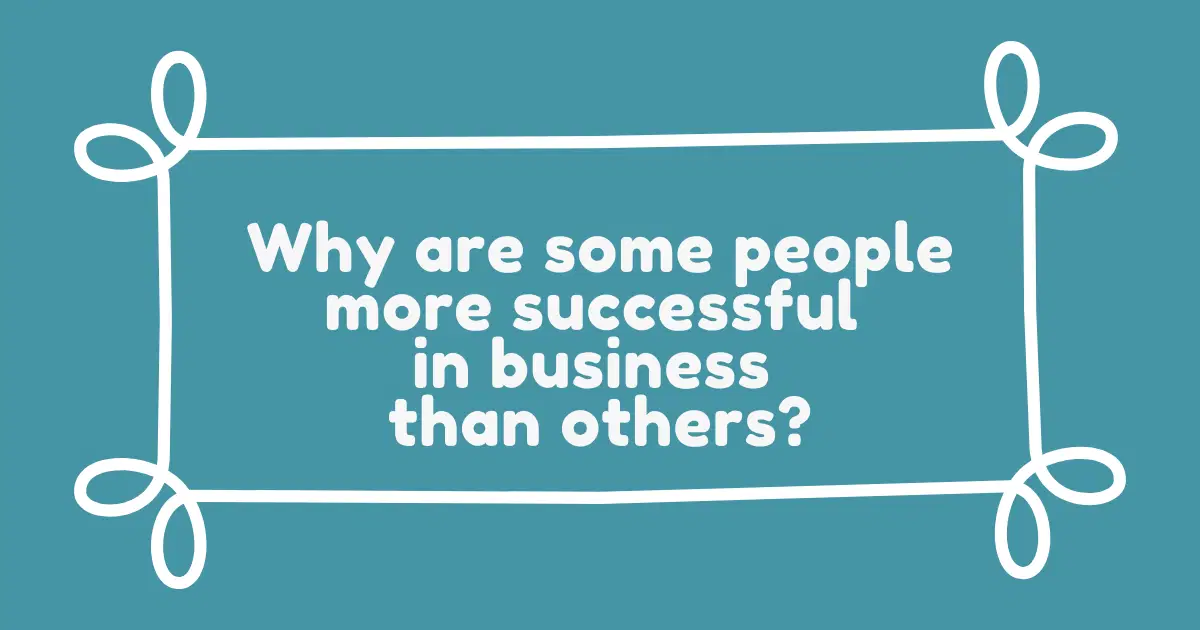What do we mean by “successful”?
Success means different things to different people. But usually, it’s some combination of these factors that most people want:
-
More money
-
More fun (or less hassle)
-
Less time at work (more life)
-
To make a positive impact on others
Your own strategy for success should be based around what you want for your life, and what you want your business to do for you.
Here are 52 things that will help. Some of them come from mega-successful entrepreneurs. Some of them from our experience with small businesses.
Each idea has the potential to dramatically improve your business and your life.
It all depends on what you do with it.
Successful people Do This:
1. Set goals. In writing. And remind themselves every morning what these goals are. Research shows this can make you over 30 times as likely to succeed.
2. Start with the end in mind. When they started their business, they had a clear vision of what it would be like when their plans came to fruition.
3. Use the 80:20 principle. They direct their effort and energy to the 20% of things which make an 80% difference.
4. Find out what their customers actually want. Instead of assuming they like what they’re getting. Or just giving what everyone else gives.
5. Give their customers what their customers want. Instead of just supplying what they know how to supply.
6. Find out what their customers hate. And make sure it never, ever happens.
7. Find out what their customers really love. And make sure it happens, every time.
8. Know where their customers are coming from. By asking, recording and analysing every enquiry.
9. Aren’t scared to ask their customers what they think of them.
10. Ask their staffs’ opinions. They often know how to do the job better. But no-one asks them.
11. Plan their escape! They know that if the business depends on them being there, working in it, then they’re holding back its growth potential. And no-one will want to buy it when they retire.
12. Rely on systems. Rather than just relying on people. If the business is only great because it’s got some exceptional people, what happens when they leave, or when you need more of them?
13. Don’t try to do everything. It’s easier to be really good at a few things. They outsource, or refer customers on for things they can’t do superbly.
14. Know that if you build a better mousetrap, the world doesn’t beat a path to your door. With an invention, or a brilliant idea, you’re about 1% of the way to success. Ask James Dyson. I’m passionate about this, because I’ve seen people waste years of their life chasing this illusion.
16. Know the lifetime value of a customer. They see each customer as a potential lifetime purchaser. They don’t just go for today’s transaction.
17. Keep a record of their customers: what they buy, what they like and when the next sales opportunity might be. The next holiday. The next haircut. The next case of wine. The next carpet.
18. Don’t burn bridges. When parting company with the boss, their staff, customers, suppliers, banks and even tax collectors. They leave the door open to do business again in the future.
19. Don’t change suppliers just to save a bit on charges. When they find a good supplier, they build a relationship, and stay with it. They are open and honest with them, and work as a team.
21. Take a firm stance on customer credit from day 1. A customer who doesn’t pay is worse than no customer. And once you let someone get away with late payment, they will always do it.
22. View problems as opportunities. They will use a customer complaint as a chance to turn that customer into a raving fan of the business.
23. Hire attitude and teach function. When they’re looking for a new team member, an enthusiastic, positive attitude is much more important than job experience. You can teach people how to do the work. You can’t teach attitude.
25. Know the Internet is not just a faster way of doing things the old way. It’s changed the whole marketing concept.
26. Know the value of a first impression. You only get one chance to do this right. When a new customer phones, or calls in, they form a lasting opinion of you in less than 20 seconds.
28. Take every opportunity to get publicity. Modesty is a non-starter in business.
29. Schedule their time off and holidays. Because unless it’s in the diary, like the work commitments are, it won’t happen. There’s always something else to do first.
32. Learn to say no. To commitments that aren’t important to them. To meetings and events that don’t take them towards their goals. And to customers who aren’t worth having.
33. Don’t ignore their health and fitness. They know that if they’re too busy to exercise, they’re too busy.
34. Take advice. They use experts to help them find the best solution to a problem, and to plan the best strategy to get to where they want to be. They don’t believe they have to do this themselves.
36. Don’t make promises they can’t keep. Better to promise delivery in 4 weeks, and do it in 3, than trying to impress the customer by quoting 2 weeks, and then letting them down. Follow the example of the airlines who quote an ETA they expect to beat.
37. Know it’s the little things that matter. And are obsessive about them. The SAS Airlines chairman said “coffee stains on the flip trays tell our customers we don’t service our engines properly”.
38. Motivate their staff. They share their vision of the business’ future. They show appreciation for a job well done. A simple thank you makes a huge difference.
39. Empower their staff. Nothing impresses a customer like a problem solved quickly, efficiently and politely. To achieve this, they give their staff the authority to see to it themselves. And back them up on their decisions afterwards.
40. Have a way of doing things that differentiates them from the others. Michael Gerber’s excellent book “The E-Myth Revisited” is the definitive work on this.
41. Delegate. First, they set out exactly how they want it to be done, and what they have to achieve. Then they train them in how to do it. Finally, they pass over the responsibility for it. And set reporting criteria.
42. Don’t abdicate the responsibility. For example, by taking on an experienced salesperson, and just telling them to just get on with it, instead of providing clear direction.
43. Structure the business properly, setting out who’s responsible for what, and who’s answerable to whom. Even if there are only 2 people in the business so far.
44. Question everything. They are constantly looking for a better way. Never automatically doing things the way everyone else does them.
46. Know the difference between working for their business, and making the business work for them. They don’t take people on to help them with their work. They take people on so they can escape from doing the work.
47. Aren’t scared to let their staff deal with their customers. They train their staff to do it superbly, and then stand back. If you insist on seeing every customer yourself, you’ve got a job, not a business.
48. Plan before they act. They don’t get carried away on a wave of their own enthusiasm. They make sure the sums make sense, too.
49. Know that profit alone isn’t enough. You can run out of money, and go bust, even when you’re trading at a good profit. They don’t assume their bank will keep on meeting an ever increasing cash gap.
50. Never solve just the current problem. They also make sure it doesn’t happen again. Or they devise a system to handle it in the future, so they don’t have to.
51. Think in terms of value, not just price. They don’t use cheap equipment that lets them down. No skimping on staff training. No home-made signs and stationery that give the message “we’re second-rate; we’re amateurs”.
52. Believe in themselves. And are passionate about what they’re doing. It rubs off on everyone around them. Their colleagues, their staff, their suppliers, their customers.

